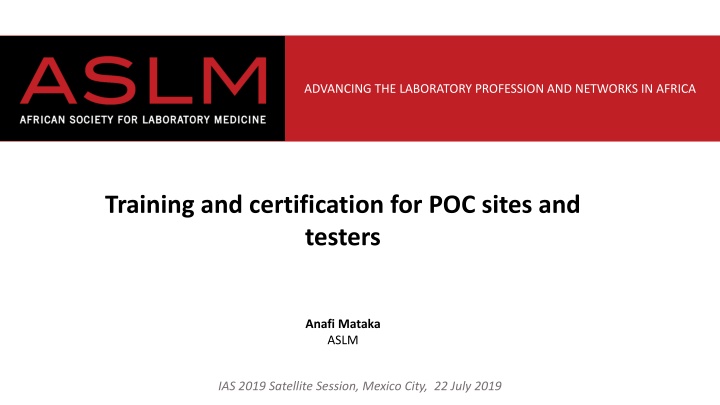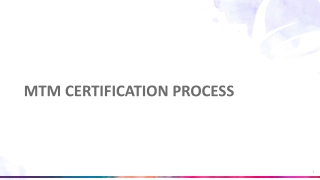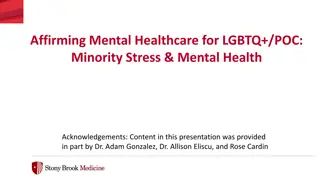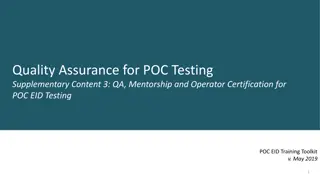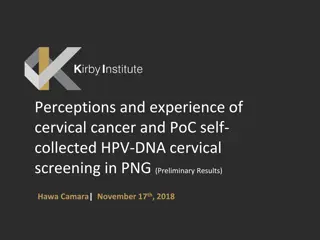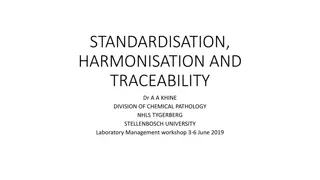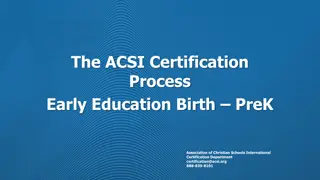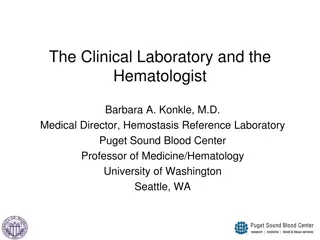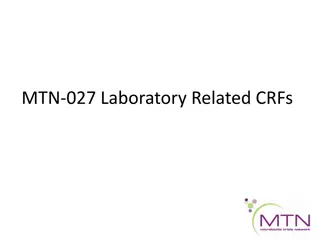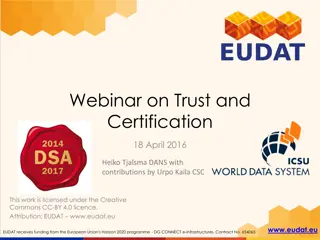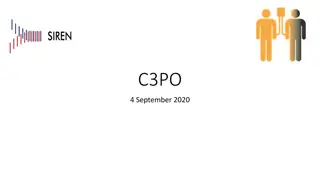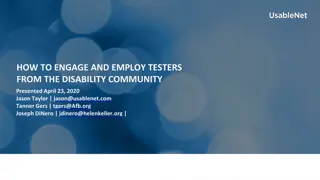Advancing Laboratory Profession and Networks in Africa: Training and Certification for POC Sites and Testers
This presentation focuses on advancing the laboratory profession in Africa by providing training and certification for point-of-care (POC) sites and testers. It emphasizes the importance of rapid testing competency, personnel, and site certification, as well as the objectives to establish a national certification framework and improve HIV rapid testing accuracy. Implementation efforts include drafting national certification frameworks, regional sensitization meetings, and identifying national certification bodies.
Download Presentation

Please find below an Image/Link to download the presentation.
The content on the website is provided AS IS for your information and personal use only. It may not be sold, licensed, or shared on other websites without obtaining consent from the author.If you encounter any issues during the download, it is possible that the publisher has removed the file from their server.
You are allowed to download the files provided on this website for personal or commercial use, subject to the condition that they are used lawfully. All files are the property of their respective owners.
The content on the website is provided AS IS for your information and personal use only. It may not be sold, licensed, or shared on other websites without obtaining consent from the author.
E N D
Presentation Transcript
ADVANCING THE LABORATORY PROFESSION AND NETWORKS IN AFRICA Training and certification for POC sites and testers Anafi Mataka ASLM IAS 2019 Satellite Session, Mexico City, 22 July 2019
Outline Introduction The Objectives Implementation
Introduction to Rapid Testing Competency Priority area in laboratory quality improvement efforts for 90-90-90 goals Major program component to effective screening, diagnosis, and viral load monitoring The First 90 and Rapid Test Performance: False positives a problem?
Personnel and site certification ISO requirement POCT - 22870 Clause 5.1.3 c: Only personnel who have completed the training and demonstrated competence shall carry out POCT. Records of training/attestation (or certification) and of retraining and re-attestation (or recertification) shall be retained. Review the RT site records Observe the RT site operations practical competence (100%) and written assessment (80%). Ask open ended questions Follow client specimen or result through the testing process
Introduction to Rapid Testing Competency ASLM and Pan African Consortium offering TA finalization of certification frameworks and implementation of selected training programs 20 RTCQI best practices in PEPFAR- supported countries: Uganda, Ghana, Zambia, Malawi, Cameroon, and Tanzania.
The Objectives To establish a national certification framework for HIV testers and testing sites To improve the accuracy and reliability of HIV rapid testing through implementation of RTCQI best practices To enhance the competency of HIV testers and testing sites towards national certification
1. National certification framework for HIV testers and testing sites Drafted and finalized framework Tanzania, Malawi, Cameroon, Uganda, Zambia Regional sensitization meetings to promote implementation of the national certification framework initiated in Tanzania, Malawi, Zambia; and is ongoing in other countries to ensure national coverage and expansion of RTCQI. National certification bodies have been identified Tanzania, Malawi, Uganda and Cameroon
Maintenance of site and tester certification. Monitoring and Evaluation
2. Improving the accuracy and reliability of HIV rapid testing through implementation of RTCQI best practices 852 SITES enrolled Refresher training sessions in preparation for national certification activities have been conducted in all countries - Tanzania, Malawi, Ghana, Cameroon, Zambia and Uganda.. Sites enrolled in RTCQI 250 197 193 200 150 150 150 93 100 69 50 0
3. Enhance the competency of HIV testers and testing sites towards national certification Regional baseline assessments conducted to assess number of available testing facilities, testing points, testers, and establish targets for Year 1 Testing points 186 150 93 Testers Targeted 600 518 100 Tanzania Uganda Zambia
3. Auditors and Competence Evaluators Trained Graph showing # of Trained Auditors and Competence Evaluators 40 36 34 35 Trained site auditors and competency evaluators to support implementation of national certification activities 30 25 20 20 20 20 19 20 17 16 16 14 15 9 10 5 0 Uganda Tanzania Cameroon Zambia Ghana Malawi Trained Auditors Competence Evaluators
3. Cont - Conducted audits of HIV testing sites towards national certification Sites enrolled in RTCQI sites audited Coverage 250 120% Coverage of audited sites over 90% in all the 6 countries 100% 100% 100% 100% 100% 200 93% 91% 80% 150 60% 100 40% 50 20% 0 0% Uganda Tanzania Cameroon Zambia Ghana Malawi
Ongoing and planned activities Tester Certification has started Tanzania (139/166 non-laboratory testers were evaluated, of which 93 certified) Other countries - not yet fully implemented Site assessment ongoing EQA Ongoing Performance of EQA in a few countries
Key take home messages Rapid HIV testing has been essential in meeting 90-90-90 goals Competency of testers is a requirement by international standards Countries need to put in place systems and institutionalize continuous improvement of rapid testing and POC. ASLM and the PAC has worked to develop national certification frameworks in 6 countries and hope to scale up to about 20 in the near future.
Thank You Become and ASLM member!
